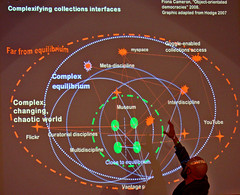Thanks to my friend Jim Wellman at the University of Washington, here's a fun little article from Brett McCracken on what he calls "Christian Hipsters."
Armed with an M.A. in media studies from UCLA, Brett McCracken is writing a book on "cool Christianity." Sounds like a great project that strikes me as an interesting insider's perspective on the continued negotiation of culture among Evangelicals.
On his blog, McCracken provides a helpful list to see if you, too, might be a Christian Hipster. Here's a sample:
The article (and other related posts) is a marvelous example of Evangelical deconstruction that is so prevalent among younger "churched" segments.
These acculturated Evangelicals alternately turn inside Evangelicalism and outside to the "secular" culture outside of it, back and forth, assessing and comparing, categorizing and typifying, highlighting the gaps between the derivative culture of Evangelicals in comparison with the more authentic and "lively" culture of the "regular" world outside the church.
(It's worth being reminded that Protestantism is founded on a critique of the institutionalized church.)
This work of poking fun at modern Evangelicalism is about their probing assumptions within the movement. It is one of the things modern Evangelicals do constantly. It happens in both seminary classes and Sunday pot-lucks. Witty and sarcastic, such discussions are great fun for insiders. (Discussions within the "Emerging/Emergent Church Movement" is almost entirely based on such repartee.)
But it's not meant to be only fun. For them, the continuity of the Reformation necessitates continual reflection on their own image. It is part of the work of the church. These and other younger Evangelicals value their identity and fear becoming mere caricatures of themselves. They want to beat others to the punch, and hopefully shift quickly to avoid any stigmatization.
And while they are not the only segment of Christianity to self-critique (nor the only religion), it's their use of broad cultural constructs that is interesting to me. These younger, "hip" Evangelicals tend to homogenize all Evangelicals. They leave themselves as the astute outsiders to the messes they see needing to be cleaned up.
Armed with an M.A. in media studies from UCLA, Brett McCracken is writing a book on "cool Christianity." Sounds like a great project that strikes me as an interesting insider's perspective on the continued negotiation of culture among Evangelicals.
On his blog, McCracken provides a helpful list to see if you, too, might be a Christian Hipster. Here's a sample:
 Labeled "Cool Christian." Image by jslander via Flickr
Labeled "Cool Christian." Image by jslander via Flickr
Christian hipsters tend not to like contemporary Christian music (CCM), or Christian films (except ironically), or any non-book item sold at Family Christian Stores.
They prefer “Christ follower” to “Christian” and can’t stand the phrases “soul winning” or “non-denominational,” and they could do without weird and awkward evangelistic methods including (but not limited to): sock puppets, ventriloquism, mimes, sign language, “beach evangelism,” and modern dance.
Christian hipsters like music, movies, and books that are well-respected by their respective artistic communities—Christian or not.
Christian hipsters love thinking and acting Catholic, even if they are thoroughly Protestant.
Christian hipsters love breaking the taboos that used to be taboo for Christians. They love piercings, dressing a little goth, getting lots of tattoos (the Christian Tattoo Association now lists more than 100 member shops), carrying flasks and smoking cloves.
The article (and other related posts) is a marvelous example of Evangelical deconstruction that is so prevalent among younger "churched" segments.
These acculturated Evangelicals alternately turn inside Evangelicalism and outside to the "secular" culture outside of it, back and forth, assessing and comparing, categorizing and typifying, highlighting the gaps between the derivative culture of Evangelicals in comparison with the more authentic and "lively" culture of the "regular" world outside the church.
 Luther's Ninety-Five Theses. Image via Wikipedia
Luther's Ninety-Five Theses. Image via Wikipedia
(It's worth being reminded that Protestantism is founded on a critique of the institutionalized church.)
This work of poking fun at modern Evangelicalism is about their probing assumptions within the movement. It is one of the things modern Evangelicals do constantly. It happens in both seminary classes and Sunday pot-lucks. Witty and sarcastic, such discussions are great fun for insiders. (Discussions within the "Emerging/Emergent Church Movement" is almost entirely based on such repartee.)
But it's not meant to be only fun. For them, the continuity of the Reformation necessitates continual reflection on their own image. It is part of the work of the church. These and other younger Evangelicals value their identity and fear becoming mere caricatures of themselves. They want to beat others to the punch, and hopefully shift quickly to avoid any stigmatization.
And while they are not the only segment of Christianity to self-critique (nor the only religion), it's their use of broad cultural constructs that is interesting to me. These younger, "hip" Evangelicals tend to homogenize all Evangelicals. They leave themselves as the astute outsiders to the messes they see needing to be cleaned up.
 Image by dalbera via Flickr
Image by dalbera via Flickr
And since social networks tend to reinforce themselves, they often seem to see the same things, use the same terms, and define reality in similar ways.
It becomes challenging to break out of their own worldview.
Despite the crude categories and the far-too-sweeping generalizations, these self-conscious discussions are part of a serious effort to think and re-think the enactment of the mission of the church in a shifting culture. And as more of them actively integrate more nuanced analytical tools, they could become even more forceful in their self-critiques and contribute even more valid insights on the variety and nuance of dynamics happening around them.
It becomes challenging to break out of their own worldview.
Despite the crude categories and the far-too-sweeping generalizations, these self-conscious discussions are part of a serious effort to think and re-think the enactment of the mission of the church in a shifting culture. And as more of them actively integrate more nuanced analytical tools, they could become even more forceful in their self-critiques and contribute even more valid insights on the variety and nuance of dynamics happening around them.




No comments:
Post a Comment